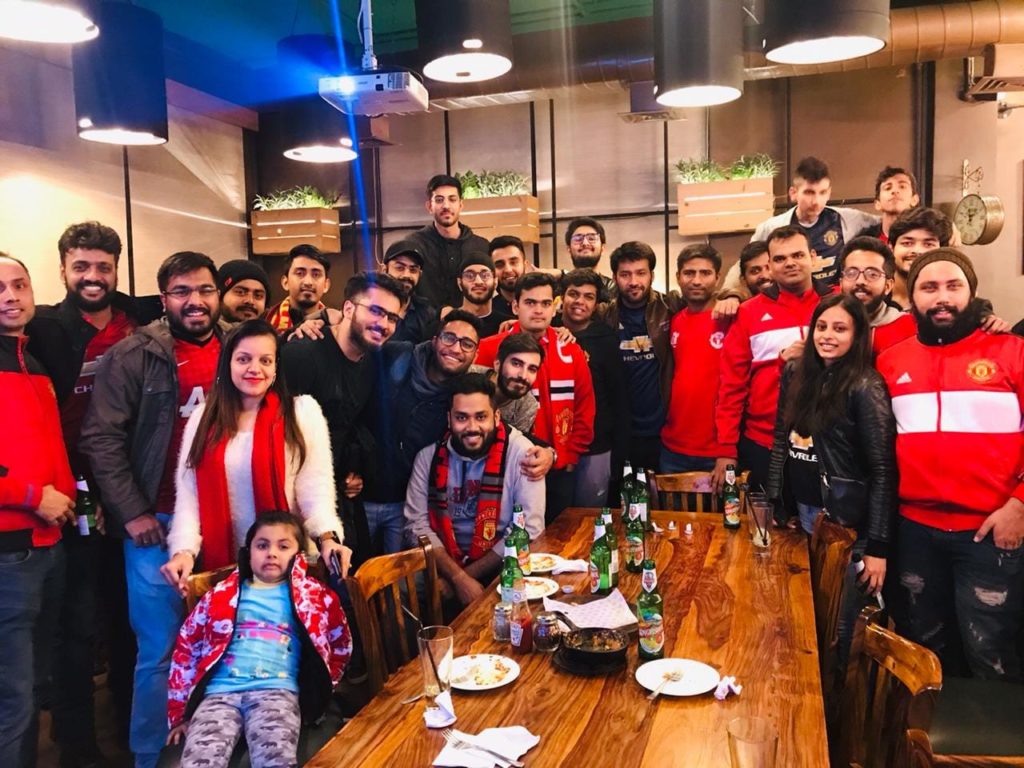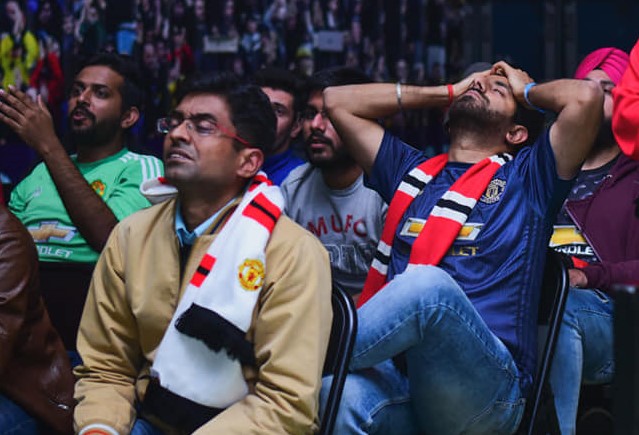In a country where Cricket occupies the subconscious to an extent where it crowds all the other sports, football is growing. How do fans support teams so far away from them?

“It all started with a little girl who was scared of the dark”.
Shruti Sharma, now a medical student at Lady Hardinge in New Delhi starts the story of her journey with football with that line not because it adds a little flavour to her story but because it is the sheer truth.
The story gets a little sappy in the middle with her eyes getting teary and red but nothing takes away from the fact that a 9-year-old girl afraid of the dark turned on the telly at 12 in the morning and saw a repeat telecast of the English Premier League and fell in love with the sport and a football club.
Rohit Roy, a young football fan from India who also took to football at first sight.
“I was 7 years old back then and a certain Wayne Rooney was coming into the fray. I don’t properly remember how, but in those days football broadcast especially EPL was scarce in India, so I remember watching a United match with the Red Devils winning it with some late goal drama as they used to back in the day and that was all it took for me to fall in love with Manchester United”

One can find such stories everywhere in India. People ‘discovering’ football and the premier league or the Bundesliga (The first-tier German league) or the Italian Serie A. According to BARC, since English Premier League was first telecasted in India in 2001, the viewership has gone up by 10% which is a significant rise for a country which relies heavily on cricket as its primary sport.
Cricket had always taken the front seat when it came to India’s preferences. Even though India does not have a national sport so to say, cricket won that title quite comfortably.
While India ranks 101 in FIFA world ranking, there is a growing legion of supporters who watch the English Premier League, La Liga and Bundesliga. The environment is changing and fans feel more connected to foreign leagues than their own home country’s leagues.
Fans feel like they belong somewhere with a larger motivation. The genuine love for the game and what it stands for breeds loyalty and fierce devotion towards perhaps one of the most popular sport in the world. Fans found new heroes in the teams they supported and their faithfulness found a new home.
“For any Indian millennial, we were born in the golden generation – of cricket, not football. Why so? Because CRT TV’s were slowly becoming commonplace in the growing middle-class population of India. The cricket craze had always been there, but now it was in colour. But cricket is a seasonal game, and sports channels had to show something in between two sets of series matches in cricket. This is where football came in”,
Srivats Venkateswara, who now works in the Netherlands but states that his formative years in India was helped by football tremendously.
Many fans in India don’t follow the domestic leagues like Indian Super League or the I-League but prefer to watch the English League or the La Liga (The Spanish league). In fact, according to a report by The Economic Times, La Liga had registered a 400% increase in its reach in India in 2017.
The drive and the passion that comes for an international club cannot be explained in simple words. Club football and even national football is something that is regionally driven. Being proximally close to the one thing you like or love will increase your passion for it, in theory. But these football fans challenge this theory every day by staying up late and watching matches, following transfer news and even traveling to the UK or any other country to watch a game live. These raw, carnal emotions is what makes a fan, a fan.
“I am a Manchester United fan. As comeback kings, I would take the lesson of never back down seriously. During my college days, I had a rough start. Then I thought to myself, my club never gives up. So why should I? My fortunes turned to the good on the continuous belief to never give up”, said Anirudh Nagraj, an Information Science graduate from Pune, India.
According to a book written by Sean Brown titled ‘Football Fans Around the World: From Supporters to Fanatics’, he states that the team’s performance affects everyday life in a tremendous manner. Self-identity, belonging and interpersonal relations are all affected by whether or not the team you like won or not.
It’s not just the Premier League or the La Liga that fans in India follow. Many choose to follow the German league as well. The Bundesliga has become one of the most popular leagues to watch in India. In fact, Bundesliga International signed a strategic partnership with IMG Reliance in India last November to develop grassroot football in the subcontinent.
“My obsession for Bayern started when I saw the Bayern Crest. I found it to be cool and started watching a few Bayern Munich videos on YouTube. Philipp Lahm was the man who made me fall in love with the game”, said Atish Ansuman, a Bayern Munich fan from India.
With the devotion and love of supporting a football team also comes disappointment and frustration. Separated by the Atlantic Ocean, for fans in India or even mainland Asia, it is extremely difficult to cope with the losses, bad seasons or player injuries. Jasneet Singh Bhatia from New Delhi has now emotionally blocked that part of his mind so as to not get affected by the losses and the bad performance.

“I’m not at all happy with what my club has done this season. Rather I’m disgusted by my club’s performance this year. Hasty managerial changes, as well as player transfer, have led to a shambolic state within the club. From giants in Europe, we’ve been reduced to mere pawns. This affected me the last 4-5 times, but from now on I’ve conditioned myself to be impervious to the club’s status”
Jasneet Singh Bhatia, New Delhi
However, supporting a team has now become easier for the lot in India because of the advent of the world wide web. Access to watching games is straightforward for someone who does not have a TV license or a set top box.
“Internet has helped me a lot. I stream all the games, watch the academy games, and follow the women’s team. It would be a whole different ball game in the modern-day football if the internet didn’t exist. Players would focus on the pitch rather than social media. Players would play for the badge in front and not to appear on Instagram and twitter posts. It really is that simple”, said Anirudh.
But perhaps what the greatest boon is for the people in India is that of the fan clubs that the fans set up for themselves.

“We in New Delhi have supporters’ clubs wherein we in groups of hundreds watch matches together. So even though we’re 10,000 miles away, it feels like the club we’re supporting is our own”, added Jasneet.
There is a fan club in every major city of India, of almost all major teams that play in the United Kingdom and mainstream Europe.
One prime example is of MUSC-NCR (Manchester United Supporter’s Club-National Capital Region) based in New Delhi and its surrounding areas. The motto of the supporter’s club is to be true to the fans working with them to build a close community of football lovers. They host regular match screenings and football tournaments to keep the engagement of the fans at an optimal level.
Loud cheery chants, flags flying around in a smoke-filled room with more than 60 fans singing the name of the team’s captain is what a typical screening in India looks like and more particularly at MUSC NCR.
“Although most of us are working in a job that demands majority of our time, we still take out time to organize each screening and come up with new ideas because it’s the love for our club which unites us and keeps us enthusiastic about it”
Jaspreet Singh, treasurer, MUSC NCR.


